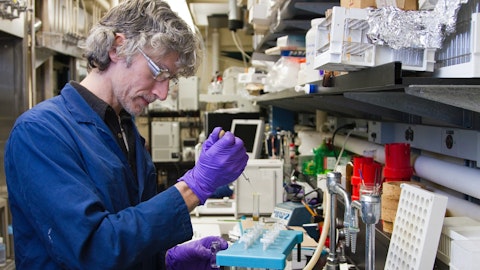August Troendle: Sure. Yes, I’ll start there. You’re absolutely right. There is, in this environment, there’s a lot more pressure to be flexible because their financing is coming. And we are, I guess, in this environment, just as adamant to make sure that we have advanced payment of things. So it is a negotiation and a client that we believe is more likely to get funding is better funded already. We might be a little bit more flexible. But in this kind of environment, we do tend to be very aggressive in terms of ensuring that we get paid for the work we do. So — and you can see that in our DSOs. We have generally favorable terms, payment because of the risk that our clients acknowledge they have. So I think that is a give and take, but I think we do a good job at it.
You can see we’re not giving considerably there in order to get work. We’re not in that kind of situation where we give up terms in order to win work. We are very firm in our negotiations that we have to make sure that we get paid. So if that means losing work, we’ll lose the work. And then your first question was about cancellations and how they occur because of fund.
David Windley: Well, no, just — I’m sorry, just kind of Max’s question around clients that are — the handful of clients that are in your backlog that have expressed a concern about some difficulty in getting their next round of funding, if I’m understanding that correctly. And I’m asking for the scenarios in which those even are in your backlog if they don’t have it’s a whole.
August Troendle: There’s a fair number of our clients that have funding for a first portion — first stage of a program or to a milestone that they see as an inflection point for their product. It may be an interim analysis. It might be a first part of the study. And there’s also clients that look to be fully funded for a project going in, but because of other things that they might do that we may not be aware of in terms of other programs they’re supporting or other spend run short of cash before they complete, and have assumed that financial markets will be able to get them there on it. So I mean I think it’s a lot of different things. And look, some of it is funding related but also the product — it’s often a fantastic revolutionary product that’s coming along is going to get funded.
I mean they’re running out of funding is not a problem. It’s always in the context of how well the product is performing too. And so during a trial, you sometimes get signs, whether it’s safety signals or otherwise that they might want to continue on. It’s not a killer for the product. It still looks interesting. It still looks promising, but not the breakthrough they’d hoped. And that leads to a challenge for getting funding for the next stage.
David Windley: Yes.
August Troendle: Does that help?
David Windley: It does. It does. Yes.





